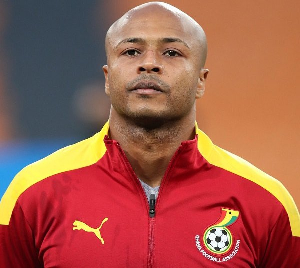The recent announcement of Otto Addo's squad for the AFCON qualifiers has once again ignited a debate among Ghanaians, particularly regarding the conspicuous absence of André Dede Ayew. As a nation, we have celebrated Dede's contributions to the Black Stars, yet his exclusion from this crucial squad raises important questions that demand critical examination.
It is crucial to first address the elephant in the room: Andre Dede Ayew has not, at any point, indicated that he is unwilling or unready to represent Ghana. His commitment to the Black Stars has been unwavering, and his experience on the international stage is invaluable. To exclude him on the grounds of supposed disinterest or lack of readiness is not only unjust but also detrimental to the national team's chances.
Furthermore, the persistent narrative that Dede and his brother, Jordan, are in the national team solely because of their father, Abedi Pele, is both unfair and unfounded. This baseless claim has fostered a climate of undue resentment towards the Ayew brothers. The Ayews have earned their places in the Black Stars through hard work, talent, and a deep-seated commitment to Ghanaian football. Abedi Pele's legacy is one of excellence, but to suggest that his sons' careers are products of nepotism undermines their individual achievements and the very spirit of meritocracy that should guide team selection.
Otto Addo was appointed as head coach of the Black Stars not to be a puppet of public opinion, but to bring his wealth of experience to bear on the team’s fortunes. His mandate is to select the best players based on merit, form, and the tactical needs of the team. The exclusion of a seasoned player like Dede Ayew, who has proven time and again his ability to perform on the biggest stages, seems to contradict this mandate.
This decision must be viewed critically. Is it truly in the best interest of the national team to leave out one of its most experienced players, especially when his leadership and presence on the pitch have been pivotal in past tournaments? Or are we, as a footballing nation, allowing unfounded public sentiments to cloud our judgment?
Otto Addo's success as a coach will not be measured by his ability to appease a vocal section of the populace but by his ability to make the tough, yet correct, decisions that lead the Black Stars to victory. He must resist the temptation to succumb to external pressures and instead rely on his knowledge, experience, and understanding of the game.
As Ghanaians, we must also reflect on our role in shaping the narratives that surround our national team. The Ayew brothers have given their all to the Black Stars, and they deserve our respect, not our disdain. Let us not allow baseless accusations and unfounded rumours to rob the team of the very players who have the potential to lead us to glory.
In conclusion, the exclusion of Andre Dede Ayew from the AFCON qualifiers is a decision that warrants serious reconsideration. Otto Addo must be reminded that his duty is to the team and the nation, not to appease a misguided section of the public. It is time for objectivity, fairness, and respect to guide the selection process. Ghana deserves nothing less.
Opinions of Saturday, 31 August 2024
Columnist: Hajj Seidu Sulemana



















